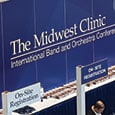.jpg) The words rewarding, daunting, and frustrating come to mind when I think of the awesome responsibility of being a mentor to student teachers. These young, future educators are usually equipped with a great deal of theory about what works in a classroom and on the podium, but they sign up for student teaching with limited practical experience. Veteran directors share in the responsibility for the future of music by passing on their knowledge and passion to the next generation of music educators.
The words rewarding, daunting, and frustrating come to mind when I think of the awesome responsibility of being a mentor to student teachers. These young, future educators are usually equipped with a great deal of theory about what works in a classroom and on the podium, but they sign up for student teaching with limited practical experience. Veteran directors share in the responsibility for the future of music by passing on their knowledge and passion to the next generation of music educators.
The most precious gift we can offer student teachers is that of rehearsal time: practical experience at the podium followed by immediate guidance, suggestions, and help. Student teachers remind us of the thrill that comes from watching the first time a young director realizes his efforts on the podium have contributed to a work. After a rehearsal some student teachers become excited – even giddy – knowing they are making progress with a piece and a difference in the lives of students. Not all rehearsals will go as well as expected; student teachers who have difficulties at the podium often make an observing veteran teacher rethink the student’s actions and the best way to deliver information to the ensemble.
Before the first day of teaching, it is important to sit down with a new student teacher and develop a timeline for the upcoming experience: six weeks of work as an observer, coach, and teacher. During this time he will be at the podium rehearsing the ensembles and planning lessons. As the student teacher’s participation increases, the different ensembles grow accustomed to the new instructor in their lives. By the fifth or sixth week, the student teacher is usually a full-time participant in the music program.
Week One
During the first days of classes and rehearsals, the student teacher should observe and participate in full ensemble rehearsals and possibly lead small-group sessions as well as individual lessons. If the student teacher takes attendance, he will quickly learn everyone’s name.
I usually introduce a new student teacher to the administration staff, the other music faculty, and to as many of the other teachers as possible as well as to all the classes. To eliminate communication problems, the student teacher should set goals on his first day in school and work to meet them. To-gether we discuss and review basic information he should know, such as the different procedures for the building, the music classrooms, and the school in general.
I suggest that you end your first meeting with the student teacher by setting up a daily time to meet and discuss problems and answer questions. Some of the following information may seem obvious, but I have found that it is helpful to provide at the beginning of student teaching.
• Arrive early to teaching assignments and dress in professional attire, such as a suit and tie for men and a dress, suit, or pants suit for women. The student teacher’s demeanor should be courteous toward the other faculty, and his discussions with students should be professional and positive.
• Complete plans for lessons and rehearsals before every class, and take initiative for projects that may include administrative work, such as taking attendance, word processing, or photocopying.
• Attend all meetings and events before, during, and after the school day, and show enthusiasm for any criticism and implement suggestions given.
• If a problem develops the student teacher should communicate di-rectly with his mentor.
Week Two
.jpg) The student teacher’s first important responsibility can be warming-up the large ensembles for rehearsals. He should take turns teaching entire lessons of other classes, such as theory and music history. During daily meetings, discussions should focus on how to manage a classroom and review lesson and rehearsal planning.
The student teacher’s first important responsibility can be warming-up the large ensembles for rehearsals. He should take turns teaching entire lessons of other classes, such as theory and music history. During daily meetings, discussions should focus on how to manage a classroom and review lesson and rehearsal planning.
Week Three
In addition to warming up the large ensembles, the student teacher handles a portion of teaching most of the other classes in the day. Daily meetings should include sharing assessment systems and grading information. Review the forms for student-teacher evaluations and how to plan a year-long calendar of music events.
Week Four
By now the student teacher has assumed nearly 80% of the teaching duties. Team teaching can be a good use of rehearsal time. I have seen student teachers work with small groups while the veteran teacher directs a rehearsal; next the two teachers change responsibilities.
This gives the ensemble a chance to receive instruction from the primary instructor as well as the attention of a director in a small ensemble. Excel-lent topics of discussion include different types of instruction for different types of learners, pacing rehearsals, and how to develop programs for concerts.
Weeks Five, Six, and Beyond
To give the student teacher a realistic experience as a band or orchestra director, he now assumes all teaching responsibilities. Talk about the importance of developing good habits for continued growth by setting long-term goals and participating in professional organizations and conferences. At this time student teachers should ask for a letter of recommendation to keep in a credentials file.
.jpg) Every student teacher and teaching situation is different. The ultimate goal of the experience is to let the student teacher develop at his own pace and at the same time provide the best education possible for the young musicians in the ensemble.
Every student teacher and teaching situation is different. The ultimate goal of the experience is to let the student teacher develop at his own pace and at the same time provide the best education possible for the young musicians in the ensemble.
Most student teachers are hungry for time and information from a mentor. Regardless of who taught the day’s lessons, spend 20 minutes a day reviewing your activities. It will give the student teacher some insight as to why you taught rhythm the way you did and help him to understand your reaction to a flute player’s chatty behavior.
When a student teacher wants to know why the brass section didn’t respond to a question, the detailed answer of a mentor will help him to evaluate and improve his teaching techniques. The discussion becomes a wonderful time to reflect for both the expert and novice teacher.
Student teachers need to absorb as much practical material as possible. They will benefit most from their experience if they leave student teaching knowing 10 or more pieces at each grade level, have a list of pieces in the school music library (hard copy or on a CD), and copies of effective lesson plans, calendars, and booster club by-laws. It gives me a great sense of pride to know I have mentored students who are now thriving in the professional world.
Mentors have the opportunity to influence generations of people, far beyond the novice student teachers who look to them for help during student teaching. Conscientious planning along with the guidance of a college supervisor can make student teaching a rewarding experience and one that will most likely begin a lifelong relationship through music.






